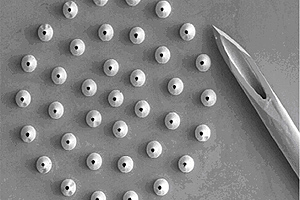Joint Cancer Research Proposals Receive Internal Support

Cordero and Gill proposed the use of microneedles to deliver drugs more accurately to cancer tissues.
A new initiative between TTUHSC and Texas Tech has awarded funding to two cancer-related proposals.
The competitive internal funding competition is meant to provide seed funding to aid researchers in securing external funding from agencies such as the National Institutes of Health and the Cancer Prevention Research Institute of Texas. This activity also is intended to foster long-term collaboration and closer relationships between researchers at the two universities.
Harvinder Gill, assistant professor of chemical engineering at Texas Tech and Joehassin Cordero, M.D., associate professor and chief of the Division of Otolaryngology, received a $50,000 grant for their proposal "Minimally-Invasive Treatment of Tongue Carcinomas Using Microneedles."
Paul Lockman, Ph.D., assistant professor in the School of Pharmacy in Amarillo, Yehia Mechref, associate professor in the Texas Tech Department of Chemistry and Biochemistry and Siva Vanapalli, assistant professor in Texas Tech’s Department of Chemical Engineering, received $50,000 for their proposal, "Defining the Chemical and Physical Signature of Breast Cancer Cells Crossing the Blood-Brain Barrier."
"One advantage of having two universities on the same campus is that it allows for easier collaboration between scientists with similar interests," said President Tedd L. Mitchell, M.D. “This grant is a testament to the synergies our universities can create in the fight against cancer."
“External funding is very competitive and difficult to win,” said Guy Bailey, Texas Tech president. “By combining the expertise of the excellent researchers at both institutions and providing seed funding we increase the chances for success in the external review process.”

Lockman, Mechref and Vanapalli's proposal will allow researchers to define characteristics of breast cancer cells that are able to cross the blood brain barrier.
The competition was divided into two categories: clinically focused and basic science focused.
The clinically focused proposal submitted by Gill and Cordero is to develop microneedles, or very small needles that are almost painless and can deliver drugs more accurately to cancer tissues. Microneedles could be used in the future to treat tumors of the mouth without having to surgically remove the tumors, enabling doctors to minimize speech, eating, cosmetic and psychological disabilities that often result from surgical removal of tumor-infested tissues, such as the tongue.
“Microneedles have tremendous potential for local treatment of mouth cancers,” Gill said. “They can allow micro-precision delivery of drugs directly into tumors and can minimize drug side effects. Microneedles can be assembled as patches containing tens of microneedles to treat large tumor surfaces or could even be attached to catheter tips to treat hard-to-reach areas of the mouth. Dr. Cordero and I are very excited to get this grant award to further develop this technology.”
The basic science-focused proposal by Lockman, Mechref and Vanapalli will allow the researchers to define characteristics of breast cancer cells that are able to cross the blood brain barrier and eventually develop into a brain metastasis or a secondary tumor in brain that started from breast cancer.
"Once a woman receives a diagnosis of brain metastases of breast cancer, she only has a 20 percent chance to survive one year" Lockman said. "Unfortunately, traditional chemotherapeutics ultimately fail in treating brain metastases. Understanding how these cells leave the main tumor, go through the blood stream and eventually migrate into the brain may be the first step into developing new therapies that may prevent the formation of brain metastasis. If our team is successful, I hope we may eradicate one of the major problems facing breast cancer patients."
Fourteen proposals were received and reviewed by a committee comprised of faculty members from across both universities.
Related Stories
Celebrating Veterans: TTUHSC’s General Martin Clay’s Legacy of Service and Leadership
From his initial enlistment in the Army National Guard 36 years ago to his leadership in military and civilian health care management roles, Major General Martin Clay’s career has been shaped by adaptability, mission focus and service to others.
Texas Tech University Health Sciences Center School of Nursing Named Best Accelerated Bachelor of Science in Nursing Program in Texas
The TTUHSC School of Nursing Accelerated Bachelor of Science in Nursing (BSN) program has been ranked the No. 1 accelerated nursing program in Texas by RegisteredNursing.org.
TTUHSC Names New Regional Dean for the School of Nursing
Louise Rice, DNP, RN, has been named regional dean of the TTUHSC School of Nursing on the Amarillo campus.
Recent Stories
The John Wayne Cancer Foundation Surgical Oncology Fellowship Program at Texas Tech University Health Sciences Center Announced
TTUHSC is collaborating with the John Wayne Cancer Foundation and has established the Big Cure Endowment, which supports the university’s efforts to reduce cancer incidence and increase survivability of people in rural and underserved areas.
TTUHSC Receives $1 Million Gift from Amarillo National Bank to Expand and Enhance Pediatric Care in the Panhandle
TTUHSC School of Medicine leaders accepted a $1 million philanthropic gift from Amarillo National Bank on Tuesday (Feb. 10), marking a transformational investment in pediatric care for the Texas Panhandle.
Texas Tech University Health Sciences Center Permian Basin Announces Pediatric Residency Program Gift
TTUHSC Permian Basin, along with the Permian Strategic Partnership and the Scharbauer Foundation, Feb. 5 announced a gift that will fund a new pediatric residency.
